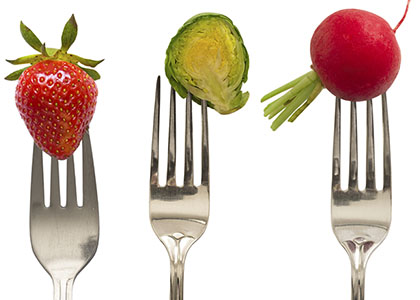
6 Eating & Juicing Tips For A Healthy Colon
By Stacy Kennedy, MPH, RD, CSO, LDN; Reboot Nutritionist
We always think of green in March for St. Patrick’s Day but this March and all year long, boast your blue too, for Colorectal Cancer Awareness. Colorectal cancer affects men and women and is the second leading cause of cancer related deaths in the US each year with 140,000 new diagnoses.
Colorectal cancer can be highly preventable with:
- Healthy plant-based diet
- Regular physical activity
- Maintaining a healthy weight
- Limiting alcohol and avoiding smoking
- Regular screening especially for men & women ages 50-75 (some at high risk need earlier screening; speak with your doctor)
Let’s take a closer look at how lifestyle habits can help reduce your risk for colorectal cancer. Watch this video to learn more about what you can do for prevention.
- Eat More Apples (& Veggies)
An apple a day might really keep the doctor away… at least your GI oncologist. Preliminary research is looking at how natural phytonutrients found in apples may have therapeutic actions in fighting the development or progression of colorectal cancer cells.Eating choices may even be able to target specific areas of the colon for encouraging prevention of colorectal cancer. An Australian study found those eating more compared to less cruciferous veggies had a 40% lower risk for developing proximal colon cancer (closer to your small intestine), think of broccoli, cabbage, kale, cauliflower, Brussels sprouts, radishes, arugula(rocket). Those eating more fruits and veggies overall as well as specifically, dark yellow vegetables and apples had up to half the risk of developing distal colon cancer (closer to and/or your rectum).
- Looking for a great cruciferous-based juice?
Try: Crisp N Clean, Bountiful Brassica, and Love your Broccoli
- Looking for a dark yellow veggie juice? This group includes some carotenoid-rich orange choices too like carrots, winter squash.
Try: Sunny G Juice, Australia Gold Juice or Harvest Cinnamon Spice Juice
- More Plants, Some Fish, Less Meat
Beyond just fruits and veggies, a plant-based diet, which includes whole grains, nuts, seeds, beans, legumes, may offer additional protection. A new study, shows that vegetarians had about 22% less risk of developing colorectal cancer, while plant-based eaters who included fish & seafood once a month and had the biggest risk reduction at 43%. These Pesco-vegetarians also limited meat consumption to once per month, another important colorectal cancer preventive strategy. Red meat intake has long been associated with increased risk for developing this type of cancer.Whether it’s the fiber, folate or phytonutrients in plants that help to lower colorectal cancer risk, the take home message is that delicious, meatless meals may help.
- Try these main course meals packed with not only fiber but also protein, thanks plants!
- Enjoy Fiber-Rich Juices
Yes that is possible! Fruits and veggies with more soluble vs insoluble fiber can lead to a more fiber-full juice. The soluble fiber, which also helps lower cholesterol, is more likely to pass into your fresh juice since it’s water-soluble. The pulp that comes out the back of your juicer contains much of the other type, insoluble fibers. Apples, pears, oranges, beets are a few examples of soluble fiber rich produce. Try this Beet-ini juice, sans the alcohol.
- Find Folic Acid in Foods
Folate or folic acid, found in green leafy veggies, citrus fruits, fortified breads, multivitamins, B-complex vitamins and other supplements may be either cancer preventive or cancer promoting. It really depends on the person, their diet and other individual factors. Diets lacking in folic acid have been shown to increase risk, but for those who received longer-term supplementation over three years, it may actually increase risk of colorectal cancer. Consuming “too much” isn’t really occurring because Americans are loading up on kale and oranges, what pushes some over their personal limit has more to do with the combination of high intake of fortified food consumption in packaged bread products, along with popping supplements haphazardly. Folate supplements were touted in the late ‘90s for helping reduce heart disease risk, and are absolutely critical in pre-natal vitamins and fortified foods for preventing certain birth defects, but today we understand the importance of personalizing not only your eating or dietary choices but your supplements as well. More is not always better… or safe.
- Looking for a folic acid-rich juice?
Try: Green Orange Juice and Citrus Inspired Green Juice
- Get More Sunshine (& Vitamin D)
The “sunshine” vitamin has received a lot of attention for its role in everything from mood to cancer prevention. Oh yea, and bones. New research highlights D’s positive influence on our immune system and how boosting our immune defenses can lower risk for colon cancer. Vitamin D isn’t technically a vitamin; it’s actually a hormone, once your body activates it. Vitamins are essential, meaning we must eat them because our body can’t create them by itself. Vitamin D is different in this way, because we can make or activate it from exposure to UV light. However, in many regions of the world, direct sunlight is lacking for a good portion of the year, inhibiting us from creating the active D we need. Speak with you doctor about getting a blood test to determine if you’re at risk for being deficient or insufficient in D and how much supplement may be best for you to take.Watch more on Vitamin D & Cancer in this video.
- Watch Your Weight
Limiting weight gain, especially around your mid-section, is another important strategy for reducing colorectal cancer risk. Read about Success Story, Kyle G, working on weight management through healthy lifestyle while fighting colon cancer.